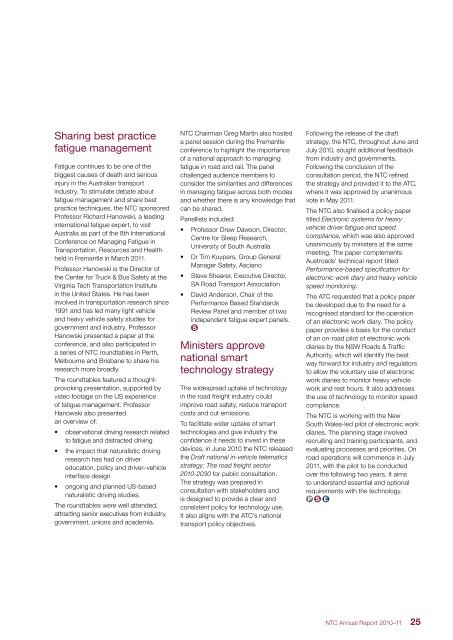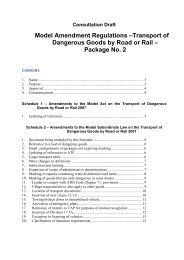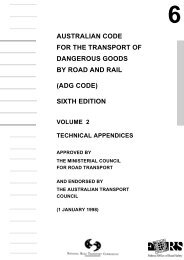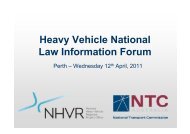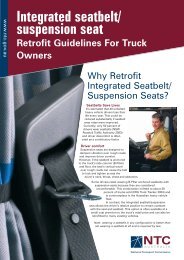2011 Annual Report - National Transport Commission
2011 Annual Report - National Transport Commission
2011 Annual Report - National Transport Commission
You also want an ePaper? Increase the reach of your titles
YUMPU automatically turns print PDFs into web optimized ePapers that Google loves.
Sharing best practice<br />
fatigue management<br />
Fatigue continues to be one of the<br />
biggest causes of death and serious<br />
injury in the Australian transport<br />
industry. To stimulate debate about<br />
fatigue management and share best<br />
practice techniques, the NTC sponsored<br />
Professor Richard Hanowski, a leading<br />
international fatigue expert, to visit<br />
Australia as part of the 8th International<br />
Conference on Managing Fatigue in<br />
<strong>Transport</strong>ation, Resources and Health<br />
held in Fremantle in March <strong>2011</strong>.<br />
Professor Hanowski is the Director of<br />
the Center for Truck & Bus Safety at the<br />
Virginia Tech <strong>Transport</strong>ation Institute<br />
in the United States. He has been<br />
involved in transportation research since<br />
1991 and has led many light vehicle<br />
and heavy vehicle safety studies for<br />
government and industry. Professor<br />
Hanowski presented a paper at the<br />
conference, and also participated in<br />
a series of NTC roundtables in Perth,<br />
Melbourne and Brisbane to share his<br />
research more broadly.<br />
The roundtables featured a thoughtprovoking<br />
presentation, supported by<br />
video footage on the US experience<br />
of fatigue management. Professor<br />
Hanowski also presented<br />
an overview of:<br />
• observational driving research related<br />
to fatigue and distracted driving<br />
• the impact that naturalistic driving<br />
research has had on driver<br />
education, policy and driver–vehicle<br />
interface design<br />
• ongoing and planned US-based<br />
naturalistic driving studies.<br />
The roundtables were well attended,<br />
attracting senior executives from industry,<br />
government, unions and academia.<br />
NTC Chairman Greg Martin also hosted<br />
a panel session during the Fremantle<br />
conference to highlight the importance<br />
of a national approach to managing<br />
fatigue in road and rail. The panel<br />
challenged audience members to<br />
consider the similarities and differences<br />
in managing fatigue across both modes<br />
and whether there is any knowledge that<br />
can be shared.<br />
Panellists included:<br />
• Professor Drew Dawson, Director,<br />
Centre for Sleep Research,<br />
University of South Australia<br />
• Dr Tim Kuypers, Group General<br />
Manager Safety, Asciano<br />
• Steve Shearer, Executive Director,<br />
SA Road <strong>Transport</strong> Association<br />
• David Anderson, Chair of the<br />
Performance Based Standards<br />
Review Panel and member of two<br />
independent fatigue expert panels.<br />
Ministers approve<br />
national smart<br />
technology strategy<br />
The widespread uptake of technology<br />
in the road freight industry could<br />
improve road safety, reduce transport<br />
costs and cut emissions.<br />
To facilitate wider uptake of smart<br />
technologies and give industry the<br />
confidence it needs to invest in these<br />
devices, in June 2010 the NTC released<br />
the Draft national in-vehicle telematics<br />
strategy: The road freight sector<br />
2010-2030 for public consultation.<br />
The strategy was prepared in<br />
consultation with stakeholders and<br />
is designed to provide a clear and<br />
consistent policy for technology use.<br />
It also aligns with the ATC’s national<br />
transport policy objectives.<br />
Following the release of the draft<br />
strategy, the NTC, throughout June and<br />
July 2010, sought additional feedback<br />
from industry and governments.<br />
Following the conclusion of the<br />
consultation period, the NTC refined<br />
the strategy and provided it to the ATC,<br />
where it was approved by unanimous<br />
vote in May <strong>2011</strong>.<br />
The NTC also finalised a policy paper<br />
titled Electronic systems for heavy<br />
vehicle driver fatigue and speed<br />
compliance, which was also approved<br />
unanimously by ministers at the same<br />
meeting. The paper complements<br />
Austroads’ technical report titled<br />
Performance-based specification for<br />
electronic work diary and heavy vehicle<br />
speed monitoring.<br />
The ATC requested that a policy paper<br />
be developed due to the need for a<br />
recognised standard for the operation<br />
of an electronic work diary. The policy<br />
paper provides a basis for the conduct<br />
of an on-road pilot of electronic work<br />
diaries by the NSW Roads & Traffic<br />
Authority, which will identify the best<br />
way forward for industry and regulators<br />
to allow the voluntary use of electronic<br />
work diaries to monitor heavy vehicle<br />
work and rest hours. It also addresses<br />
the use of technology to monitor speed<br />
compliance.<br />
The NTC is working with the New<br />
South Wales-led pilot of electronic work<br />
diaries. The planning stage involved<br />
recruiting and training participants, and<br />
evaluating processes and priorities. On<br />
road operations will commence in July<br />
<strong>2011</strong>, with the pilot to be conducted<br />
over the following two years. It aims<br />
to understand essential and optional<br />
requirements with the technology.<br />
NTC <strong>Annual</strong> <strong>Report</strong> 2010–11 25


